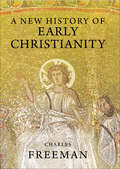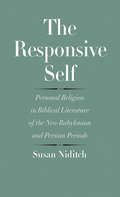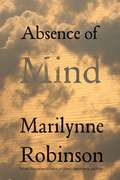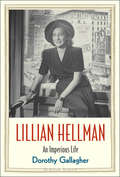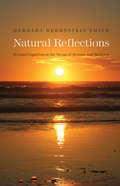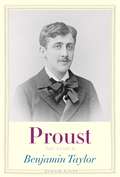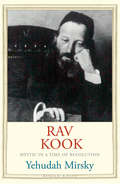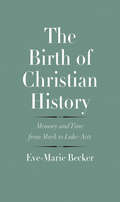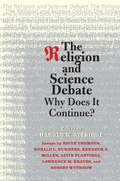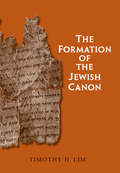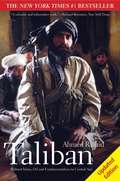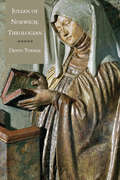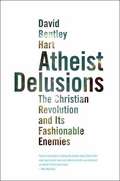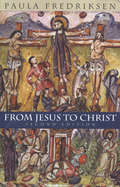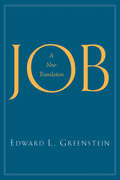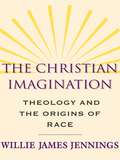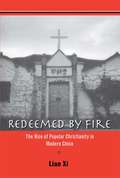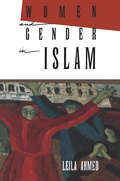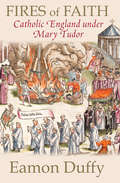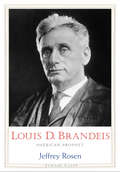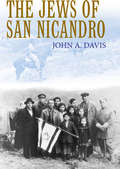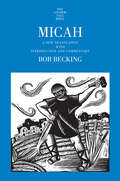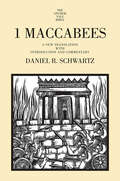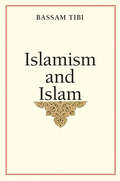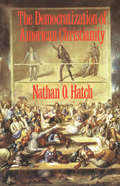- Table View
- List View
A New History of Early Christianity
by Charles FreemanThe relevance of Christianity is as hotly contested today as it has ever been. A New History of Early Christianityshows how our current debates are rooted in the many controversies surrounding the birth of the religion and the earliest attempts to resolve them. Charles Freeman's meticulous historical account of Christianity from its birth in Judaea in the first century A. D. to the emergence of Western and Eastern churches by A. D. 600 reveals that it was a distinctive, vibrant, and incredibly diverse movement brought into order at the cost of intellectual and spiritual vitality. Against the conventional narrative of the inevitable "triumph" of a single distinct Christianity, Freeman shows that there was a host of competing Christianities, many of which had as much claim to authenticity as those that eventually dominated. Looking with fresh eyes at the historical record, Freeman explores the ambiguities and contradictions that underlay Christian theology and the unavoidable compromises enforced in the name of doctrine. Tracing the astonishing transformation that the early Christian church underwent--from sporadic niches of Christian communities surviving in the wake of a horrific crucifixion to sanctioned alliance with the state--Charles Freeman shows how freedom of thought was curtailed by the development of the concept of faith. The imposition of "correct belief," religious uniformity, and an institutional framework that enforced orthodoxy were both consolidating and stifling. Uncovering the difficulties in establishing the Christian church, he examines its relationship with Judaism, Gnosticism, Greek philosophy and Greco-Roman society, and he offers dramatic new accounts of Paul, the resurrection, and the church fathers and emperors.
The Responsive Self
by Susan NiditchWorks created in the period from the Babylonian conquest of Judea through the takeover and rule of Judea and Samaria by imperial Persia reveal a profound interest in the religious responses of individuals and an intimate engagement with the nature of personal experience. Using the rich and varied body of literature preserved in the Hebrew Bible, Susan Niditch examines ways in which followers of Yahweh, participating in long-standing traditions, are shown to privatize and personalize religion. Their experiences remain relevant to many of the questions we still ask today: Why do bad things happen to good people? Does God hear me when I call out in trouble? How do I define myself? Do I have a personal relationship with a divine being? How do I cope with chaos and make sense of my experience? What roles do material objects and private practices play within my religious life? These questions deeply engaged the ancient writers of the Bible, and they continue to intrigue contemporary people who try to find meaning in life and to make sense of the world. The Responsive Self studies a variety of phenomena, including the use of first-person speech, seemingly autobiographic forms and orientations, the emphasis on individual responsibility for sin, interest in the emotional dimensions of biblical characters, and descriptions of self-imposed ritual. This set of interests lends itself to exciting approaches in the contemporary study of religion, including the concept of "lived religion," and involves understanding and describing what people actually do and believe in cultures of religion.
Absence of Mind: The Dispelling of Inwardness from the Modern Myth of the Self
by Marilynne RobinsonIn this ambitious book, acclaimed writer Marilynne Robinson applies her astute intellect to some of the most vexing topics in the history of human thought--science, religion, and consciousness. Crafted with the same care and insight as her award-winning novels, Absence of Mind challenges postmodern atheists who crusade against religion under the banner of science. In Robinson's view, scientific reasoning does not denote a sense of logical infallibility, as thinkers like Richard Dawkins might suggest. Instead, in its purest form, science represents a search for answers. It engages the problem of knowledge, an aspect of the mystery of consciousness, rather than providing a simple and final model of reality. By defending the importance of individual reflection, Robinson celebrates the power and variety of human consciousness in the tradition of William James. She explores the nature of subjectivity and considers the culture in which Sigmund Freud was situated and its influence on his model of self and civilization. Through keen interpretations of language, emotion, science, and poetry, Absence of Mind restores human consciousness to its central place in the religion-science debate.
Lillian Hellman
by Dorothy GallagherGlamorous, talented, audacious--Lillian Hellman knew everyone, did everything, had been everywhere. By the age of twenty-nine she had written The Children’s Hour, the first of four hit Broadway plays, and soon she was considered a member of America’s first rank of dramatists, a position she maintained for more than twenty-five years. Apart from her literary accomplishments--eight original plays and three volumes of memoirs--Hellman lived a rich life filled with notable friendships, controversial political activity, travel, and love affairs, most importantly with Dashiell Hammett. But by the time she died, the truth about her life and works had been called into question. Scandals attached to her name, having to do with sex, with money, and with her own veracity. Dorothy Gallagher confronts the conundrum that was Lillian Hellman--a woman with a capacity to inspire outrage as often as admiration. Exploring Hellman’s leftist politics, her Jewish and Southern background, and her famous testimony before the House Un-American Activities Committee, Gallagher also undertakes a new reading of Hellman’s carefully crafted memoirs and plays, in which she is both revealed and hidden. Gallagher sorts through the facts and the myths, arriving at a sharply drawn portrait of a woman who lived large to the end of her remarkable life and never backed down from a fight.
Natural Reflections: Human Cognition at the Nexus of Science and Religion
by Barbara Herrnstein SmithIn this important and original book, eminent scholar Barbara Herrnstein Smith describes, assesses, and reflects upon a set of contemporary intellectual projects involving science, religion, and human cognition. One, which Smith calls "the New Naturalism," is the effort to explain religion on the basis of cognitive science. Another, which she calls "the New Natural Theology," is the attempt to reconcile natural-scientific accounts of the world with traditional religious belief. These two projects, she suggests, are in many ways mirror images--or "natural reflections"--of each other. Examining these and related efforts from the perspective of a constructivist-pragmatist epistemology, Smith argues that crucial aspects of belief--religious and other--that remain elusive or invisible under dominant rationalist and computational models are illuminated by views of human cognition that stress its dynamic, embodied, and interactive features. She also demonstrates how constructivist understandings of the formation and stabilization of knowledge--scientific and other--alert us to similarities in the springs of science and religion that are elsewhere seen largely in terms of difference and contrast. InNatural Reflections,Smith develops a sophisticated approach to issues often framed only polemically. Recognizing science and religion as complex, distinct domains of human practice, she also insists on their significant historical connections and cognitive continuities and offers important new modes of engagement with each of them.
Proust
by Benjamin Taylor"Taylor's endeavor is not to explain the life by the novel or the novel by the life but to show how different events, different emotional upheavals, fired Proust's imagination and, albeit sometimes completely transformed, appeared in his work. The result is a very subtle, thought-provoking book. "--Anka Muhlstein, author of Balzac's Omelette and Monsieur Proust's Library Marcel Proust came into his own as a novelist comparatively late in life, yet only Shakespeare, Balzac, Dickens, Tolstoy, and Dostoyevsky were his equals when it came to creating characters as memorably human. As biographer Benjamin Taylor suggests, Proust was a literary lightweight before writing his multivolume masterwork In Search of Lost Time, but following a series of momentous historical and personal events, he became--against all expectations--one of the greatest writers of his, and indeed any, era. This insightful, beautifully written biography examines Proust's artistic struggles--the "search" of the subtitle--and stunning metamorphosis in the context of his times. Taylor provides an in-depth study of the author's life while exploring how Proust's personal correspondence and published works were greatly informed by his mother's Judaism, his homosexuality, and such dramatic events as the Dreyfus Affair and, above all, World War I. As Taylor writes in his prologue, "Proust's Search is the most encyclopedic of novels, encompassing the essentials of human nature. . . . His account, running from the early years of the Third Republic to the aftermath of World War I, becomes the inclusive story of all lives, a colossal mimesis. To read the entire Search is to find oneself transfigured and victorious at journey's end, at home in time and in eternity too. "
Rav Kook
by Yehudah MirskyRav Abraham Isaac Kook (1865-1935) was one of the most influential--and controversial--rabbis of the twentieth century. A visionary writer and outstanding rabbinic leader, Kook was a philosopher, mystic, poet, jurist, communal leader, and veritable saint. The first chief rabbi of Jewish Palestine and the founding theologian of religious Zionism, he struggled to understand and shape his revolutionary times. His life and writings resonate with the defining tensions of Jewish life and thought.A powerfully original thinker, Rav Kook combined strict traditionalism and an embrace of modernity, Orthodoxy and tolerance, piety and audacity, scholasticism and ecstasy, and passionate nationalism with profound universalism. Though little known in the English-speaking world, his life and teachings are essential to understanding current Israeli politics, contemporary Jewish spirituality, and modern Jewish thought. This biography, the first in English in more than half a century, offers a rich and insightful portrait of the man and his complex legacy. Yehudah Mirsky clears away widespread misunderstandings of Kook's ideas and provides fresh insights into his personality and worldview. Mirsky demonstrates how Kook's richly erudite, dazzlingly poetic writings convey a breathtaking vision in which "the old will become new, and the new will become holy."
The Birth of Christian History: Memory and Time from Mark to Luke-Acts
by Eve-Marie BeckerThe first comprehensive account to explore the beginnings of early Christian history writing, tracing its origin to the Gospel of Mark and Luke-Acts When the Gospel writings were first produced, Christian thinking was already cognizant of its relationship to ancient memorial cultures and history-writing traditions. Yet, little has been written about exactly what shaped the development of early Christian literary memory. In this eye-opening new study, Eve-Marie Becker explores the diverse ways in which history was written according to the Hellenistic literary tradition, focusing specifically on the time during which the New Testament writings came into being: from the mid-first century until the early second century CE. While acknowledging cases of historical awareness in other New Testament writings, Becker traces the origins of this historiographical approach to the Gospel of Mark and Luke-Acts. Offering a bold new framework, Becker shows how the earliest Christian writings shaped “Christian” thinking and writing about history.
The Religion and Science Debate
by Lawrence M. Krauss Ronald L. Numbers Kenneth R. Miller Robert Wuthnow Harold W. Attridge Keith Stewart Thomson Alvin PlantingaEighty-one years after America witnessed the Scopes trial over the teaching of evolution in public schools, the debate between science and religion continues. In this book scholars from a variety of disciplines--sociology, history, science, and theology--provide new insights into the contemporary dialogue as well as some perspective suggestions for delineating the responsibilities of both the scientific and religious spheres. Why does the tension between science and religion continue? How have those tensions changed during the past one hundred years? How have those tensions impacted the public debate about so-called "intelligent design" as a scientific alternative to evolution? With wit and wisdom the authors address the conflict from its philosophical roots to its manifestations within American culture. In doing so, they take an important step toward creating a society that reconciles scientific inquiry with the human spirit. This book, which marks the one hundredth anniversary of The Terry Lecture Series, offers a unique perspective for anyone interested in the debate between science and religion in America.
The Formation of the Jewish Canon
by Timothy H. LimThe discovery of the Dead Sea Scrolls provides unprecedented insight into the nature of the Hebrew Bible or Old Testament before its fixation. Timothy Lim here presents a complete account of the formation of the canon in Ancient Judaism from the emergence of the Torah in the Persian period to the final acceptance of the list of twenty-two/twenty-four books in the Rabbinic period. Using the Hebrew Bible, the Scrolls, the Apocrypha, the Letter of Aristeas, the writings of Philo, Josephus, the New Testament, and Rabbinic literature as primary evidence he argues that throughout the post-exilic period up to around 100 CE there was not one official "canon" accepted by all Jews; rather, there existed a plurality of collections of scriptures that were authoritative for different communities. Examining the literary sources and historical circumstances that led to the emergence of authoritative scriptures in ancient Judaism, Lim proposes a theory of the majority canon that posits that the Pharisaic canon became the canon of Rabbinic Judaism in the centuries after the destruction of the Jerusalem Temple.
Taliban: Islam, Oil, and the New Great Game in Central Asia (2nd Edition)
by Ahmed RashidA new, revised edition of the universally acclaimed and best-selling account of the Islamic fundamentalist Taliban movement - the most radical and extreme Islamic movement the world has seen. '[An] excellent study which . . . has now sold more than 750,000 copies in [22] languages.' - Financial Times 'It took our political classes an unconscionable time to wake up to the importance of Ahmed Rashid's definitive study of the Taliban. The book has been a phenomenal success.' - The Independent 'Read this remarkable book and the bewildering complexity of Afghan politics and the deadly over-spill of chaos, narcotics and sectarian violence into the surrounding region will become clear.' - Sunday Times 'Ahmed Rashid's book describes the stuff that Bond [films] are made of. Warring tribes, clashing empires, fanatics with dreams of world domination, violence and sex . . . If anyone understands the place Rashid does.' - The Observer 'The book they are all reading.' - The Guardian
Julian of Norwich, Theologian
by Denys TurnerFor centuries readers have comfortably accepted Julian of Norwich as simply a mystic. In this astute book, Denys Turner offers a new interpretation of Julian and the significance of her work. Turner argues that this fourteenth-century thinker's sophisticated approach to theological questions places her legitimately within the pantheon of other great medieval theologians, including Thomas Aquinas, Bernard of Clairvaux, and Bonaventure. Julian wrote but one work in two versions, a Short Text recording the series of visions of Jesus Christ she experienced while suffering a near-fatal illness, and a much expanded Long Text exploring the theological meaning of the "showings" some twenty years later. Turner addresses the apparent conflict between the two sources of Julian's theology: on the one hand, her personal revelation of God's omnipotent love, and on the other, the Church's teachings on and her own witnessing of evil in the world that deserves punishment, even eternal punishment. Offering a fresh and elegant account of Julian's response to this conflict--one that reveals its nuances, systematic character, and originality--this book marks a new stage in the century-long rediscovery of one of the English language's greatest theological thinkers.
Atheist Delusions: The Christian Revolution and Its Fashionable Enemies
by David Bentley HartTHIS BOOK IS IN NO SENSE an impartial work of history. Perfect detachment is impossible for even the soberest of historians, since the writing of history necessarily demands some sort of narrative of causes and effects, and is thus necessarily an act of interpretation, which by its nature can never be wholly free of prejudice. But I am not really a historian, in any event, and I do not even aspire to detachment. In what follows, my prejudices are transparent and unreserved, and my argument is in some respects willfully extreme (or so it might seem). I think it prudent to admit this from the outset, if only to avoid being accused later of having made some pretense of perfect objectivity or neutrality so as to lull the reader into a state of pliant credulity. What I have written is at most a "historical essay," at no point free of bias, and intended principally as an apologia for a particular understanding of the effect of Christianity upon the development of Western civilization.
From Jesus to Christ
by Paula FredriksenIn this exciting book, Paula Fredriksen answers these questions by placing the various canonical images of Jesus within their historical contexts. She provides fascinating insights into the content of Jesus's ministry, the circumstances of his crucifixion, and the social and religious problems facing the earliest churches.
Job: A New Translation
by Edward L. GreensteinThis revelatory new translation of Job by one of the world’s leading biblical scholars will reshape the way we read this canonical text The book of Job has often been called the greatest poem ever written. The book, in Edward Greenstein’s characterization, is “a Wunderkind, a genius emerging out of the confluence of two literary streams” which “dazzles like Shakespeare with unrivaled vocabulary and a penchant for linguistic innovation.” Despite the text’s literary prestige and cultural prominence, no English translation has come close to conveying the proper sense of the original. The book has consequently been misunderstood in innumerable details and in its main themes. Edward Greenstein’s new translation of Job is the culmination of decades of intensive research and painstaking philological and literary analysis, offering a major reinterpretation of this canonical text. Through his beautifully rendered translation and insightful introduction and commentary, Greenstein presents a new perspective: Job, he shows, was defiant of God until the end. The book is more about speaking truth to power than the problem of unjust suffering.
The Christian Imagination: Theology and the Origins of Race
by Willie James JenningsWhy has Christianity, a religion premised upon neighborly love, failed in its attempts to heal social divisions? In this ambitious and wide-ranging work, Willie James Jennings delves deep into the late medieval soil in which the modern Christian imagination grew, to reveal how Christianity's highly refined process of socialization has inadvertently created and maintained segregated societies. A probing study of the cultural fragmentation--social, spatial, and racial--that took root in the Western mind, this book shows how Christianity has consistently forged Christian nations rather than encouraging genuine communion between disparate groups and individuals. Weaving together the stories of Zurara, the royal chronicler of Prince Henry, the Jesuit theologian Jose de Acosta, the famed Anglican Bishop John William Colenso, and the former slave writer Olaudah Equiano, Jennings narrates a tale of loss, forgetfulness, and missed opportunities for the transformation of Christian communities. Touching on issues of slavery, geography, Native American history, Jewish-Christian relations, literacy, and translation, he brilliantly exposes how the loss of land and the supersessionist ideas behind the Christian missionary movement are both deeply implicated in the invention of race. Using his bold, creative, and courageous critique to imagine a truly cosmopolitan citizenship that transcends geopolitical, nationalist, ethnic, and racial boundaries, Jennings charts, with great vision, new ways of imagining ourselves, our communities, and the landscapes we inhabit.
Redeemed by Fire: The Rise of Popular Christianity in Modern China
by Lian XiThis book is the first to address the history and future of homegrown, mass Chinese Christianity. Drawing on a large collection of fresh sources--including contemporaneous accounts, diaries, memoirs, archival material, and interviews--Lian Xi traces the transformation of Protestant Christianity in twentieth-century China from a small, beleaguered "missionary" church buffeted by antiforeignism to an indigenous popular religion energized by nationalism and millenarianism. Lian shows that, with a current membership that rivals that of the Chinese Communist Party, and the ability to galvanize China's millions into apocalyptic convulsion and messianic exuberance, the popular Christian movement channels the aspirations and the discontent of the masses and will play an important role in shaping the country's future.
Women and Gender in Islam: Historical Roots of a Modern Debate
by Leila AhmedAre Islamic societies inherently oppressive to women? Is the trend among Islamic women to appear once again in veils and other traditional clothing a symbol of regression or an effort to return to a “pure†? Islam that was just and fair to both sexes? In this book Leila Ahmed adds a new perspective to the current debate about women and Islam by exploring its historical roots, tracing the developments in Islamic discourses on women and gender from the ancient world to the present. In order to distinguish what was distinctive about the earliest Islamic doctrine on women, Ahmed first describes the gender systems in place in the Middle East before the rise of Islam. She then focuses on those Arab societies that played a key role in elaborating the dominant Islamic discourses about women and gender: Arabia during the period in which Islam was founded; Iraq during the classical age, when the prescriptive core of legal and religious discourse on women was formulated; and Egypt during the nineteenth and twentieth centuries, when exposure to Western societies led to dramatic social change and to the emergence of new discourses on women. Throughout, Ahmed not only considers the Islamic texts in which central ideologies about women and gender developed or were debated but also places this discourse in its social and historical context. Her book is thus a fascinating survey of Islamic debates and ideologies about women and the historical circumstances of their position in society, the first such discussion using the analytic tools of contemporary gender studies.
Fires of Faith: Catholic England under Mary Tudor
by Eamon DuffyThe reign of Mary Tudor has been remembered as an era of sterile repression, when a reactionary monarch launched a doomed attempt to reimpose Catholicism on an unwilling nation. Above all, the burning alive of more than 280 men and women for their religious beliefs seared the rule of "Bloody Mary" into the protestant imagination as an alien aberration in the onward and upward march of the English-speaking peoples. In this controversial reassessment, the renowned reformation historian Eamon Duffy argues that Mary's regime was neither inept nor backward looking. Led by the queen's cousin, Cardinal Reginald Pole, Mary's church dramatically reversed the religious revolution imposed under the child king Edward VI. Inspired by the values of the European Counter-Reformation, the cardinal and the queen reinstated the papacy and launched an effective propaganda campaign through pulpit and press. Even the most notorious aspect of the regime, the burnings, proved devastatingly effective. Only the death of the childless queen and her cardinal on the same day in November 1558 brought the protestant Elizabeth to the throne, thereby changing the course of English history.
Louis D. Brandeis: American Prophet
by Jeffrey RosenAccording to Jeffrey Rosen, Louis D. Brandeis was "the Jewish Jefferson," the greatest critic of what he called "the curse of bigness," in business and government, since the author of the Declaration of Independence. Published to commemorate the hundredth anniversary of his Supreme Court confirmation on June 1, 1916, Louis D. Brandeis: American Prophet argues that Brandeis was the most farseeing constitutional philosopher of the twentieth century. In addition to writing the most famous article on the right to privacy, he also wrote the most important Supreme Court opinions about free speech, freedom from government surveillance, and freedom of thought and opinion. And as the leader of the American Zionist movement, he convinced Woodrow Wilson and the British government to recognize a Jewish homeland in Palestine. Combining narrative biography with a passionate argument for why Brandeis matters today, Rosen explores what Brandeis, the Jeffersonian prophet, can teach us about historic and contemporary questions involving the Constitution, monopoly, corporate and federal power, technology, privacy, free speech, and Zionism.
The Jews Of San Nicandro
by John A. DavisNot many people know of the utterly extraordinary events that took place in a humble southern Italian town in the first half of the twentieth century—and those who do have struggled to explain them. In the late 1920s, a crippled shoemaker had a vision where God called upon him to bring the Jewish faith to this “dark corner” in the Catholic heartlands, despite his having had no prior contact with Judaism itself. By 1938, about a dozen families had converted at one of the most troubled times for Italy’s Jews. The peasant community came under the watchful eyes of Mussolini’s regime and the Catholic Church, but persisted in their new belief, eventually securing approval of their conversion from the rabbinical authorities, and emigrating to the newly founded State of Israel, where a community still exists today. In this first fully documented examination of the San Nicandro story, John A. Davis explains how and why these incredible events unfolded as they did. Using the converts’ own accounts and a wide range of hitherto unknown sources, Davis uncovers the everyday trials and tribulations within this community, and shows how they intersected with many key contemporary issues, including national identity and popular devotional cults, Fascist and Catholic persecution, Zionist networks and postwar Jewish refugees, and the mass exodus that would bring the Mediterranean peasant world to an end. Vivid and poignant, this book draws fresh and intriguing links between the astonishing San Nicandro affair and the wider transformation of twentieth-century Europe.
Micah: A New Translation with Introduction and Commentary (The Anchor Yale Bible Commentaries)
by Bob BeckingA new translation and commentary on the biblical book of Micah that proposes a convincing new theory of its composition history While the biblical book of Micah is most famous for its images of peace—swords forged into to plowshares, spears turned into pruning hooks—and its passages of prophetic hope, the book is largely composed of prophecies of ruin. The historical Micah, who likely lived in the late eighth century BCE, is the first recorded prophet to predict the fateful fall of Jerusalem, and he also foretells the destruction of the regions of Samaria and Judah, in addition to the more well-known promises of Judah’s eventual restoration. Bob Becking translates the Hebrew text anew and illuminates the book’s most important elements, including its literary features, political context, and composition history. Drawing on ancient Near Eastern comparative evidence, archaeological notes, and inscriptions, Becking surveys the debates surrounding the book’s interpretation and argues that it be regarded as three separate source texts: the early first chapter; a large middle section containing a proto-apocalyptic, alternating prophetic futurology collected and molded by a later redactor; and an added section advocating for legal reform under Josiah.
1 Maccabees: A New Translation with Introduction and Commentary (The Anchor Yale Bible Commentaries)
by Daniel R. SchwartzA new translation and commentary on I Maccabees that offers a fresh interpretation of the author’s values and purpose First Maccabees, composed in the second century BCE, chronicles four decades of clashes between Hellenistic Syria and Judea, from Antiochus Epiphanes’s ascent to the throne in 175 BCE to the Hasmoneans’ establishment of an independent Judean state, ruled by Simon and his sons. In this volume, Daniel R. Schwartz provides a new translation of the Greek text and analyzes its historical significance. In dialogue with contemporary scholarship, the introduction surveys the work’s themes, sources, and transmission, while the commentary addresses textual details and issues of historical reconstruction, often devoting special attention to the lost Hebrew original and its associations. Schwartz demonstrates that 1 Maccabees, despite its Hebraic biblical style and its survival within the Christian canon, deviates from biblical and Judaic works by marginalizing God, evincing scorn for martyrs, and ascribing to human power and valor crucial historical roles. This all fits its mandate: justification of the Hasmonean dynasty, especially the Simonides.
Islamism and Islam
by Bassam TibiDespite the intense media focus on Muslims and their religion since the tragedy of 9/11, few Western scholars or policymakers today have a clear idea of the distinctions between Islam and the politically based fundamentalist movement known as Islamism. In this important and illuminating book, Bassam Tibi, a senior scholar of Islamic politics, provides a corrective to this dangerous gap in our understanding. He explores the true nature of contemporary Islamism and the essential ways in which it differs from the religious faith of Islam. Drawing on research in twenty Islamic countries over three decades, Tibi describes Islamism as a political ideology based on a reinvented version of Islamic law. In separate chapters devoted to the major features of Islamism, he discusses the Islamist vision of state order, the centrality of antisemitism in Islamist ideology, Islamism's incompatibility with democracy, the reinvention of jihadism as terrorism, the invented tradition of shari'a law as constitutional order, and the Islamists' confusion of the concepts of authenticity and cultural purity. Tibi's concluding chapter applies elements of Hannah Arendt's theory to identify Islamism as a totalitarian ideology.
The Democratization of American Christianity
by Nathan O. HatchIn this prize-winning book Nathan O. Hatch offers a provocative reassessment of religion and culture in the early days of the American republic, arguing that during this period American Christianity was democratized and common people became powerful actors on the religious scene. Hatch examines five distinct traditions or mass movements that emerged early in the nineteenth century—the Christian movement, Methodism, the Baptist movement, the black churches, and the Mormons—showing how all offered compelling visions of individual potential and collective aspiration to the unschooled and unsophisticated. "Rarely do works of scholarship deserve as much attention as this one. The so-called Second Great Awakening was the shaping epoch of American Protestantism, and this book is the most important study of it ever published."—James Turner, Journal of Interdisciplinary History "The most powerful, informed, and complex suggestion yet made about the religious, political, and psychic 'opening' of American life from Jefferson to Jackson. . . . Hatch's reconstruction of his five religious mass movements will add popular religious culture to denominationalism, church and state, and theology as primary dimensions of American religious history."—Robert M. Calhoon, William and Mary Quarterly "Hatch's revisionist work asks us to put the religion of the early republic in a radically new perspective. . . . He has written one of the finest books on American religious history to appear in many years."—James H. Moorhead, Theology Today The manuscript version of this book was awarded the 1988 Albert C. Outler Prize in Ecumenical Church History from the American Society of Church History Awarded the 1989 book prize of the Society for Historians of the Early American Republic for the best book in the history of the early republic (1789-1850) Co-winner of the 1990 John Hope Franklin Publication Prize given by the American Studies Association for the best book in American Studies Nathan O. Hatch is professor of history and vice president for Graduate Studies and Research at the University of Notre Dame.
